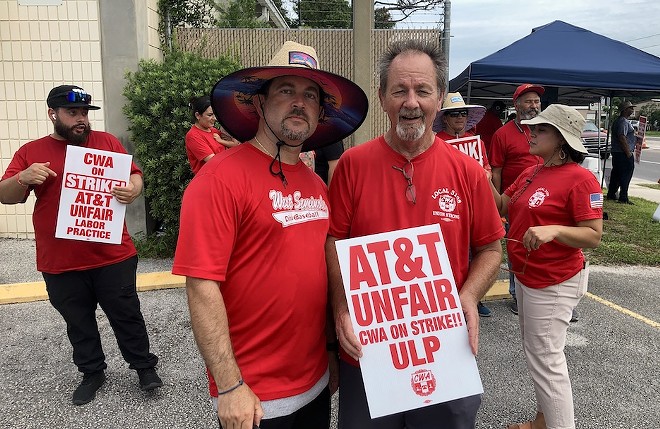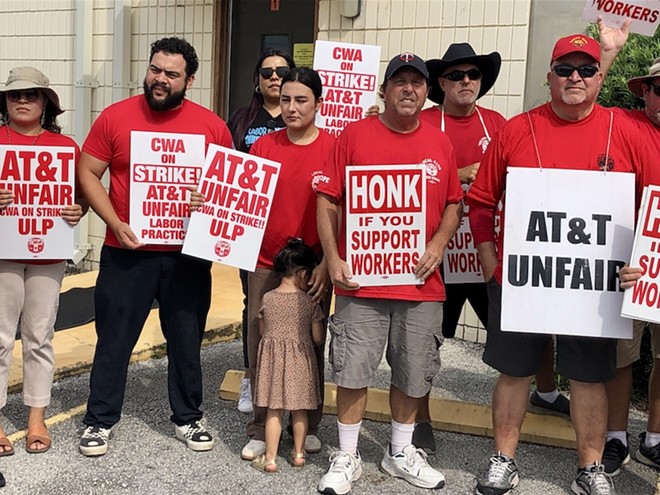
photo by McKenna Schueler
AT&T employees in Orlando continued picketing Friday, Sept. 13, over allegations of bad faith bargaining against AT&T.
After a monthlong strike, about 17,000 union-represented AT&T employees in Florida and other states across the U.S. South are back on the job Monday, after their union managed to reach a tentative deal with the telecommunications giant over the weekend. The deal concludes the longest telecommunications industry strike in the region’s history, beating out a 22-day strike by 675,000 AT&T telephone workers across the U.S. in 1983.
The five-year agreement reached Sunday, still subject to union members’ final approval, includes an average across-the-board wage increase of about 19 percent for the covered workforce, according to the Communications Workers of America labor union, with an initial 5 percent increase effective the Sunday after ratification, if approved. The agreement would also deliver an additional 3 percent raises for lower-paid machine operators and wire technicians, whom company leadership has in the past allegedly described as “second class” employees.
The agreement would cover about 4,250 employees who work across Florida, if approved, including customer service representatives and other frontline blue-collar workers who help install and maintain the multibillion-dollar telecom company’s residential and business wireless telecommunications network.
“We are incredibly proud of our members and thank CWA members, retirees and allies across the country for the solidarity that has sustained us through these difficult negotiations,” said Richard Honeycutt, vice president of CWA District 3 (covering the Southeast) in a statement. “Their willingness to make sacrifices in order to win major improvements in their contract not just for themselves, but for future members is truly inspiring.”
The workers’ strike officially launched on Aug. 16 over allegations that the company was failing to meet union reps (including workers chosen by their fellow union members to represent them) at the bargaining table in good faith. Under the National Labor Relations Act, it’s unlawful for either the union or the employer to engage in what are known as “bad faith” bargaining tactics, such as unnecessarily delaying or obstructing the process of securing a collective bargaining agreement (i.e. union contract).
The Dallas-based telecom giant rejected the unions’ claims of bad faith bargaining, and said that they’ve sought to reach a “fair” agreement with the CWA all along. “As we’ve said since day 1, our goal has been to reach fair agreements that recognize the hard work our employees do to serve our customers,” said Jeff McElfresh, chief operating officer for AT&T, in a statement. “And that’s exactly what was accomplished.”
The agreement reached, he added, will “support our competitive position in the broadband industry where we can grow and win against our mostly non-union competitors.”

photo by McKenna Schueler
AT&T workers in Orlando, joined by fellow union members with Central Florida Jobs With Justice, strike over allegations of bad faith bargaining.
The agreement covering workers in Florida and other Southern states came shortly after the company similarly reached a tentative, separate deal covering roughly 8,500 AT&T employees in California and Nevada. That four-year deal similarly offers a wage boost, includes “improvements” to overtime and scheduling practices, and builds on what the union describes as “historic achievements” secured under a previous contract.
Workers in Florida, a state widely considered hostile to unions, organized daily picket lines across the state over the last month — stretching from Miami to Tampa to Orlando and up to Pensacola — as bargaining reps for both the union and AT&T continued to meet in Texas for contract talks. Union members from other local labor unions, including hospitality union UNITE HERE, and elected officials also showed up to march alongside workers amid Florida’s scorching heat in solidarity.
In addition to wage increases, the new agreement reached for Florida workers also slightly reduces the number of forced overtime hours the company can require from installation and repair technicians, and addresses healthcare benefits, another key issue voiced by workers on the picket line.
“Medical expenses are huge,” Keith Harmon, a local AT&T technician from St. Cloud and steward for his union, told Orlando Weekly on the picket line shortly after the strike began. A union analysis of both parties’ contract offers, distributed to union members in early September, estimated that AT&T’s so-called best and final offer for workers in the Southeast could leave families facing thousands of dollars in additional healthcare costs from higher premiums, higher deductibles and higher out-of-pocket maximums. The union’s proposal, on the other hand, sought to reduce healthcare costs.
According to the CWA, the tentative agreement reached over the weekend with AT&T includes “steady” healthcare premiums in the first year of the contract, lowered premiums in the second and third years, and “modest monthly increases” in the final two years.
A summary of the tentative agreement put together by the union shows that current employees with a family insurance plan could see their insurance premiums go from $283 per month for a less-expensive plan (or $418 for a higher-cost option) to $339 per month (or $460 per month) in 2029, the final year of the contract. Monthly contributions for employees with individual coverage plans would see overall increases of less than $25 total over the life of the contract.
Forbes reported earlier this year that six of the top 10 states for most expensive healthcare in the country are located in the South, including Florida. While North Carolina is reportedly the most expensive state for healthcare in the U.S., Florida has has the highest average premium for people with employer-provided family health insurance coverage. That’s on top of other steep living expenses in the Sunshine state, from the cost of rent, to groceries, property insurance (for the homeowners out there), childcare and auto insurance.
Union members in Florida and across the Southeast in Alabama, Georgia, Kentucky, Louisiana, Mississippi, North Carolina, South Carolina and Tennessee are expected to vote on whether to approve the agreement in the coming weeks.
Subscribe to Orlando Weekly newsletters.
Follow us: Apple News | Google News | NewsBreak | Reddit | Instagram | Facebook | Twitter | or sign up for our RSS Feed





